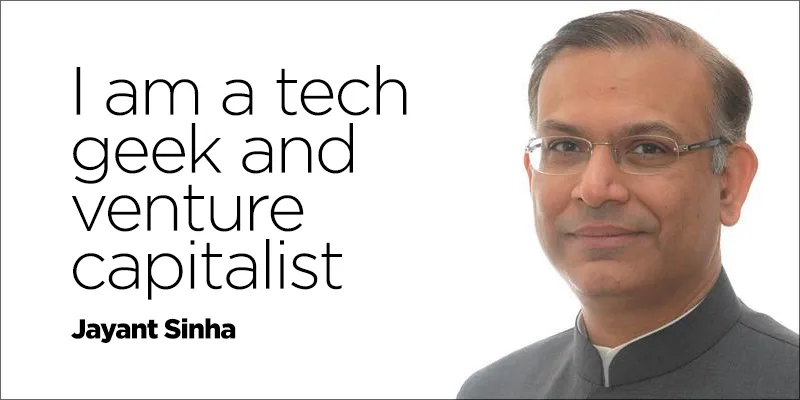“India is an unruly economy but that's what makes us creative and innovative” - Jayant Sinha, MoS for Finance
"Having been an entrepreneur and a VC and a techie and I have always believed that transitional costs of disruptions are high and we need to balance that,” said Minister of State for Finance Jayant Sinha, in a fireside chat at an iSpirit event in Bengaluru on Friday.
He spoke about how the startup ecosystem is changing and growing in India. In the past two years we have heard and seen a lot about Startup India and Stand Up India. "Our job is to make regulations much simpler and freer for startups so that entrepreneurs can focus on innovation," Sinha added.

Conducive policies for driving growth
"We need to create an innovation-driven economy and not only a globally competent economy," he said.
The idea of the government is to make things simpler and create a sense of balance. There are processes that need to be streamlined, which makes everyday innovation easier. And carving out a regulation and rule-free zone is important.
"Having worked with NASSCOM in the late 90s, I know how building of the parks helped the IT and BPO industry. With the Startup India initiative that's exactly what we are trying to do," Sinha added.
The government is also working with 20 top institutions to build strong innovators. With the Atal Innovation Mission tinkering labs, grand innovation plans are laid out, and incubators and accelerators are being built to help startups innovate and grow even in their early stages.
How will you as an entrepreneur work towards innovating for someone who earns less than Rs 5,000 in a month?
As I see it there are two innovation poles in the globe: Silicon Valley and Bengaluru. But while in the Valley you have to innovate for the people who are possibly driving the next model of Tesla, in India you have different problems and needs," Sinha opined.
India must be the entrepreneurial engine for the next six billion people across the globe and the government's role is that of a facilitator. It has to set the framework and enable ecosystems to flourish.
While there are several Startup India efforts being pushed, the government is working towards building a strong domestic venture capital in India, Sinha said.
Building an India specific VC Fund
"Over 95 percent of VC money comes from wealth funds from across the globe and not Indian sources. Nothing wrong with that. But we need to have strong Indian VC fund that has its roots and source here," Sinha said.
The government is working with India-specific VC funds and associations to bring in policy and tax structural changes to cater to a domestic venture capital fund out of India.
It is not enough to be an anchor investor, we need to create institutional LPs in India. We are working closely LIC, so that anything that SEBI does through India Aspiration Fund will be matched through LIC and other insurance companies," Sinha explained.
On strengthening the public sector banks, Sinha said, "We are doing everything to bring a strong reform agenda to all the public sector banks to consolidate them all. We will have eight to 10 public sector banks that are very competitive."
De facto privatisation
On de facto privatisation, Sinha believed that public sector enterprises would languish if they are made uncompetitive. “This builds de facto privatisation of wealth and ultimately people suffer. This leads to unequal distribution of wealth,” he added.
Nature of Indian entrepreneurship
Sinha said that creative disruption, though ultimately the best for the economy, comes at a very high transitional cost. With the nature of business models transforming, job creation becomes a serious issue.
Having been on the other side and seeing people lose their jobs and homes, I know that disruptions can be difficult and costly, but we need to work together on this issue and find a balance. Flipkart deferring jobs to the IIM graduates affects the ecosystem and recruitment for startups," Sinha said.







